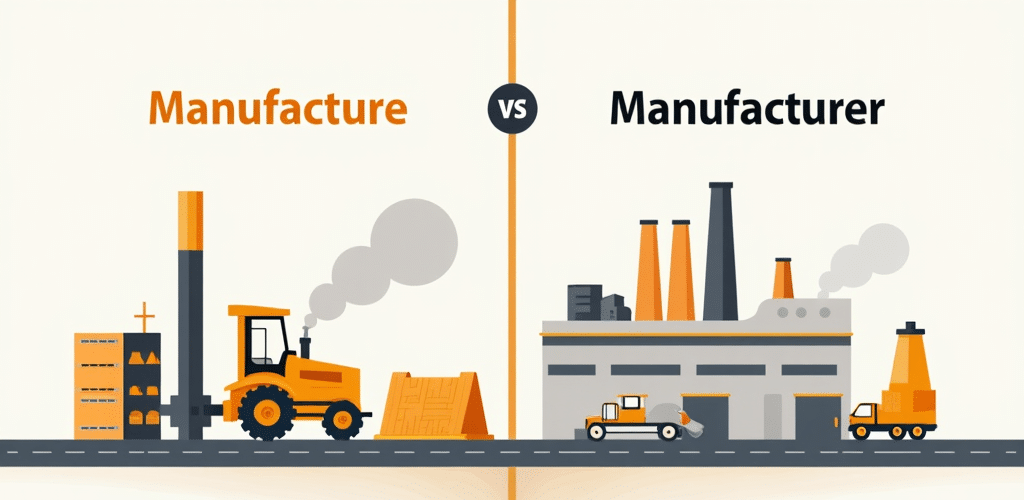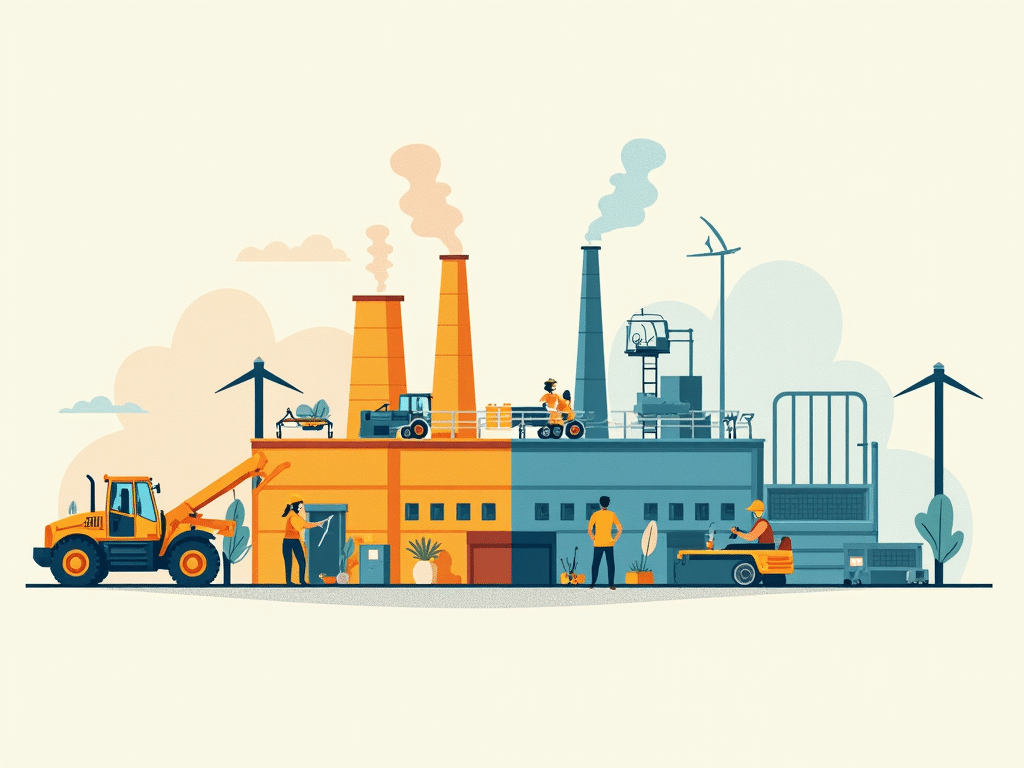Ever wondered about the difference between “manufacture” and “manufacturer”? These words might sound similar, but they play distinct roles in the world of production and industry. Let’s break it down in a way that’s easy to grasp and remember.
| Term | Function | Meaning |
|---|---|---|
| Manufacture | Verb/Noun | The act of making goods; the process of production |
| Manufacturer | Noun | The entity that produces goods on a large scale |

Manufacture: The Action Hero
Think of “manufacture” as the action hero of the production world. It’s all about doing something – specifically, making things on a big scale using machines or industrial processes.
Here’s what you need to know about “manufacture”:
- It’s mainly used as a verb
- It describes the act of making products
- Sometimes, it can be a noun too
Let’s see it in action:
- “The company manufactures smartphones in its overseas factories.”
- “They manufacture high-quality furniture using sustainable materials.”
When used as a noun, “manufacture” refers to the whole process of making products. For example:
“The manufacture of electric vehicles has increased significantly in recent years.”
Expert Tip
When writing about production processes, use “manufacture” to describe the action. It adds clarity and precision to your descriptions.
Manufacturer: The Doer
Now, let’s talk about “manufacturer.” This word is always a noun, and it refers to the person, company, or entity that does the manufacturing.
Here’s what makes a manufacturer:
- It’s the entity responsible for production
- It can be a person, company, or organization
- It’s always a noun
Let’s look at some examples:
- Apple is a leading manufacturer of consumer electronics
- Toyota is known for manufacturing quality vehicles
- Boeing is a significant manufacturer in the aerospace industry
Key Functions of Manufacturers
Manufacturers do more than just make stuff. They’re responsible for:
- Production: Creating goods at scale
- Quality Control: Making sure products meet required standards
- Supply Chain Management: Overseeing how goods move from production to distribution
Remember, understanding these terms isn’t just about grammar – it’s about clearly communicating how things are made and who’s making them. Whether you’re writing a report, discussing industry trends, or just trying to understand how your favorite products come to be, knowing the difference between “manufacture” and “manufacturer” will help you express your ideas more accurately.
Key Differences: Breaking It Down
Let’s dive deeper into what sets “manufacture” and “manufacturer” apart:
- Grammatical Function
- Manufacture: Primarily a verb, sometimes a noun
- Manufacturer: Always a noun
- Action vs. Actor
- Manufacture: Describes the action or process
- Manufacturer: Identifies who’s doing the action
- Usage in Sentences
- Manufacture: “They manufacture cars in Detroit.”
- Manufacturer: “Ford is a major car manufacturer.”
Why It Matters
Understanding these differences isn’t just about acing your English test. It’s crucial for:
- Clear business communication
- Accurate technical writing
- Precise industry discussions
Impact on Industry and Communication
In the business world, using these terms correctly can make a big difference. Here’s why:
- Clarity: It helps avoid confusion in contracts and agreements
- Precision: It allows for accurate descriptions of processes and responsibilities
- Professionalism: Proper usage demonstrates industry knowledge
Common Misconceptions
Let’s clear up some mix-ups:
- Misconception: “Manufacture” and “manufacturer” are interchangeable.
Reality: They have distinct meanings and uses. - Misconception: Only big companies can be manufacturers.
Reality: Any entity that produces goods on a large scale is a manufacturer, regardless of size.
Practical Applications
Understanding these terms can help in various situations:
- Reading Product Labels: Knowing the manufacturer helps you identify who made the product.
- Writing Business Reports: Using the correct term adds professionalism to your work.
- Understanding News Articles: Differentiating between the process and the entity helps grasp industry news better.
Real-World Example
Let’s say you’re reading about a new smartphone:
- “TechCo manufactures its latest model in Asia.”
- “TechCo, a leading smartphone manufacturer, announced a new model.”
See how the different uses give you different information?
Conclusion: Wrapping It Up
To sum it up:
- Manufacture is about the action of making things
- Manufacturer is about who’s doing the making
Knowing this difference helps you:
- Communicate more clearly
- Understand industry processes better
- Write more professionally about production and business
Remember, language is a tool. The better you understand it, the more effectively you can use it. Whether you’re writing a school paper, reading the news, or just trying to figure out who made your favorite gadget, these distinctions matter.
So next time you hear about manufacturing or see a product label, you’ll know exactly what’s being talked about and who’s involved. It’s not just about words – it’s about understanding the world of production and industry a little bit better.







